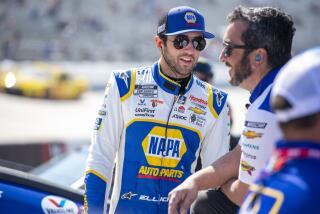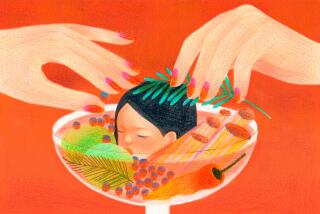Next for NASCAR: Hard Liquor Ads
- Share via
Hard liquor is nothing new to stock car racing, a sport that can trace its roots to bootleggers running moonshine through the Carolina hills in souped-up sedans.
So there was a sense of NASCAR’s returning to its roots on Wednesday with the announcement that it will reverse a decades-old policy and allow its cars and race tracks to display ads for hard liquor.
“We felt the time was right,” NASCAR President Mike Helton said in a prepared statement.
But while many on the racing circuit hailed the move as a way to generate tens of millions in new sponsorships, others worried that NASCAR was taking sports television down a risky path.
Stock car racing is the second-most watched sport on television. Its policy change will, in effect, put hard liquor companies back on network television where they have not been able to buy commercial time for more than 50 years.
“You’ll have liquor billboards rolling around the track hundreds of times, constantly in view of the cameras,” said George Hacker of the Center for Science in the Public Interest, a Washington D.C. consumer advocacy group. “This ought to raise some eyebrows.”
Perhaps no other sport is as sponsor friendly as stock car racing. Its brightly painted cars bear logos for such diverse products as M&M;’s, America Online and Viagra.
NASCAR has also welcomed beer companies and, more recently, the makers of malt liquor.
But dating to the 1970s, the circuit had maintained a policy against hard liquor sponsors. Executives changed their mind, they said, because of a change in the way the distillers have been promoting themselves.
“Spirits companies are recognized as leaders in responsibility and are encouraging adults who choose to drink, to do so responsibly,” Helton said.
He also hoped for “numerous new sponsorship opportunities to our teams.”
Tremendous costs associated with the sport -- the price of operating a NASCAR team can run as high as $17 million a year -- puts pressure on owners and drivers to find new revenue sources.
Within hours of Wednesday’s announcement, the maker of Crown Royal Canadian whiskey said it would sponsor the Roush Racing team, which included drivers Kurt Busch and Matt Kenseth.
“It’s important for us to have access to the marketing money as it’s being spent in America,” said Geoff Smith, president of Roush Racing. “This category represents a significant amount of marketing energy we haven’t been able to take advantage of. It will be a big boost to many race teams.”
But at least one driver, Morgan Shepherd, warned about the repercussions.
Though he has no sponsor and races on an annual budget of only $1.1 million, Shepherd said his past as “a drunk, a partyer” made him uneasy about the new influx of sponsor dollars.
“If you can show me any good it can do, I’ll go back to drinking now,” he said. “What they’re doing, is it worth the price of how many families this is going to affect and how many people are going to get hurt by it?”
For more than 50 years, broadcast networks have upheld a voluntary ban on hard liquor ads. Two years ago, NBC began airing such commercials but stopped after several months.
Network executives said they were influenced by members of Congress who threatened to hold hearings. Distillers alleged the network was appeasing some of its biggest advertisers: Beer and wine companies.
Recently, hard liquor has found a more welcome market in motor sports. Crown Royal has a multi-year sponsorship deal with the International Race of Champions. Jim Beam sponsors Michael Andretti’s car in the Indy Racing League.
Cable television has also accepted hard liquor commercials and distillers spent $36.5 million on such advertising last year, according to Nielsen Monitor Plus.
The Distilled Spirits Council of the United States, an industry group, says such opportunities are only fair given that beer and malt liquor are allowed to sponsor, for instance, football and baseball telecasts.
“Alcohol is alcohol,” council president Peter Cressy said Wednesday in a prepared statement.
Executives at major networks contacted for this article said their voluntary ban on hard liquor ads would not change.
But, faced with the prospect of his cameras focused on the Crown Royal car for several hours, NBC sports vice president Mike McCarley said: “We will identify cars with the best identifier, whether that is the number or the sponsor’s logo.”
NASCAR said every hard liquor company associated with its races must follow a responsibility code set down by the Distilled Spirits Council, which has campaigned against drunk drivers and underage drinking.
“What impressed me from the very start is they seemed to be really serious about having the marketing done in a responsible manner,” said John Moulden, president of the National Commission Against Drunk Driving, a broad-based coalition whose members include beer and liquor companies.
“They have a tremendous influence among 16-34 males, the prime drunk-driving group,” Moulden said. “I said ‘You have a big opportunity to [promote] the right kind of message, to be responsible. They seemed very receptive to that.”
But as a specialist in alcohol policies, Hacker wondered how fans at the track might see the words “Drink Responsibly” on a car whizzing past at almost 200 mph. He said “having the liquor industry in charge of promoting responsibility is like having Ronald McDonald educate kids about proper eating.”
Moulden suggested that only time can gauge the consequences of NASCAR’s decision.
“We’re all going to keep a close look on it,” he said.
*
Staff writers Larry Stewart and Meg James contributed to this report.
More to Read
Go beyond the scoreboard
Get the latest on L.A.'s teams in the daily Sports Report newsletter.
You may occasionally receive promotional content from the Los Angeles Times.











